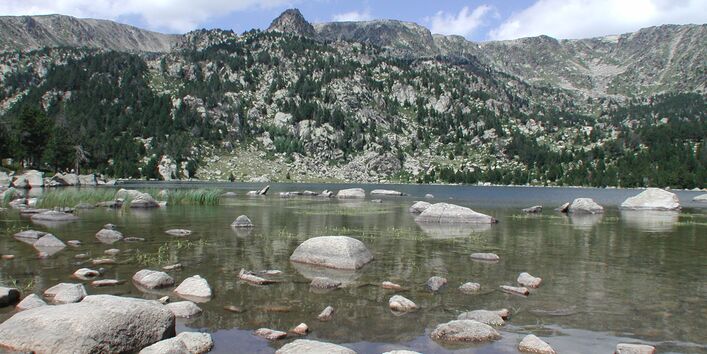The Alps through the ages
Humans have had a decisive impact on the Alps for about 6,000 years. As a sensitive ecosystem, any environmental problem in the region can quickly pose a threat to the very existence of plants, animals and man. In recent times, modern forms of use including tourism, hydropower and transit traffic have caused serious changes to the natural and cultural environment of the Alpine region. Mountain forests in particular are suffering from the effects of widescale air pollution and the growth of traffic. Thru-traffic also significantly impairs the quality of life for many residents of Alpine valleys. A return to traditional, pre-industrial agriculture as a form of sustainable land use is no solution to the crisis. What is needed now are new, alternative development concepts which combine economic security with social equity and ecological viability. The economic and societal framework conditions require a fundamental change. Furthermore, the Alps are affected to a large extent by developments in Europe. One example is the agricultural sector in the Alps, which is able to stand up to the competition of intensive farming elsewhere in Europe only with the greatest of efforts. Last but not least, climate change is increasingly affecting the highly sensitive and endangered ecosystem of the Alpine region.
Goal of an overarching policy for the Alps
The goal of an overarching policy for the Alps must be to secure stability in terms of its living environment and as an economic space in the heart of Europe for all Alpine residents. At the same time, its unique and diverse natural and cultural landscape must be preserved over the long term. To achieve this goal, the eight Alpine countries (France, Italy, Slovenia, Austria, Switzerland, Liechtenstein, Monaco, and Germany) and the European Union (EU) agreed in 1991 on a political framework programme for the protection and sustainable development of the region. The result: the Alpine Convention.
Green Economy in the Alpine region
The Alpine region offers a great deal of potential for the development of a Green Economy. A Green Economy can help to master the challenges of climate change, increasing demographic change and rural depopulation, while also creating jobs and initiating training measures for the people who live in the Alps.
The Sixth Report on the State of the Alps uses key indicators and examples of best practice to illustrate the current state of affairs and development of a Green Economy in the Alps region. The report was drafted by an expert group at UBA during the German Presidency of the Alpine Convention in 2015/16. The report reveals that many encouraging initiatives and measures and people who are actively working to promote the greening of the Alpine economy. However, the region is still far from being a truly green, ecologically compatible economy. And this is why UBA was commissioned to work out a comprehensive and ambitious action programme in time for the XV. Alpine Conference in 2018. The Action Programme for a Green Economy in the Alpine area makes concrete proposals for realizing a Green Economy in the Alps. During the course of the project, stakeholder dialogues will enable the broad-based participation of regional players.
The topic of a Green Economy in the Alps was also the focus of two projects funded by the BMU and UBA:
- The Alpenkonvention AAA+ project by CIPRA Germany seeks to support communities in the German Alps in their efforts to promote positive development and to strengthen awareness of sustainability. The project will advance the implementation of three core issues of the Alpine Convention – climate change, mobility and sustainable tourism.
- The Alpine.Mobility.Camps project organizes activity-oriented workshops for sustainable mobility in select Alpine tourist destinations. The focus is on involving and empowering local players in tourism and the population.
